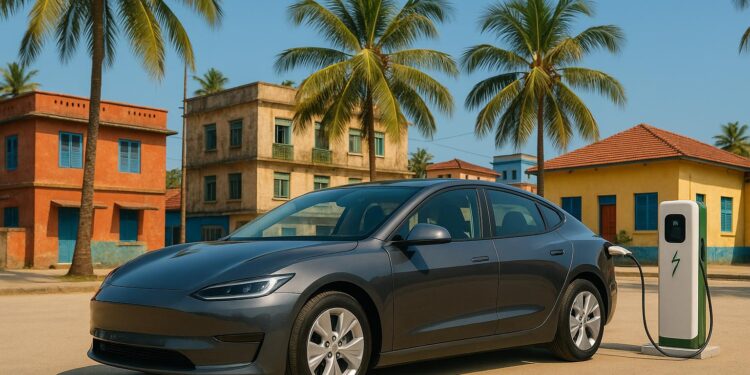Tanzania’s electric vehicle (EV) market is growing, driven by rising fuel costs, air pollution concerns, and government incentives like VAT and customs duty exemptions. EVs are cheaper to operate than gas cars, with charging costs at only 7% of fuel expenses. However, the upfront cost can be challenging. Here’s a quick look at affordable EVs available in Tanzania:
- Nissan Leaf (Used): Starting at $7,400, ideal for city commutes with a range of up to 212 miles.
- TRÍ E2 Electric Three-Wheeler: Priced at $3,500, designed for commercial use with a range of 62+ miles.
- Toyota Prius Plug-in Hybrid (Used): Starting at $9,300, combines electric driving with a gasoline engine for longer trips.
- Hyundai Kona Electric (Used): Starting at $13,000, offering a range of 242–248 miles, suitable for families.
- Chinese Budget Models (e.g., BYD, Jinpeng): Prices start as low as $2,130, providing affordable options for short-distance urban travel.
Quick Comparison:
| Model | Price Range (USD) | Range (Miles) | Best For |
|---|---|---|---|
| Nissan Leaf (Used) | $7,400 – $11,100 | Up to 212 | Urban commuters |
| TRÍ E2 Electric Three-Wheeler | $3,500 | 62+ | Commercial drivers |
| Toyota Prius Plug-in Hybrid | $9,300 – $13,000 | 39 (electric) | Mixed city and long-distance |
| Hyundai Kona Electric (Used) | $13,000 – $18,500 | 242–248 | Families and professionals |
| Chinese Budget Models | $2,130 – $22,500 | 87–252 | Affordable urban travel |
Tanzania’s EV market is expanding, with over 5,000 EVs already on the road. While public charging is still developing, home charging is a practical solution. EVs not only reduce transport costs but also improve air quality in cities like Dar es Salaam and Arusha. Now is a great time to consider making the switch.
Tanzania unveils its first locally-made electric car
1. Nissan Leaf
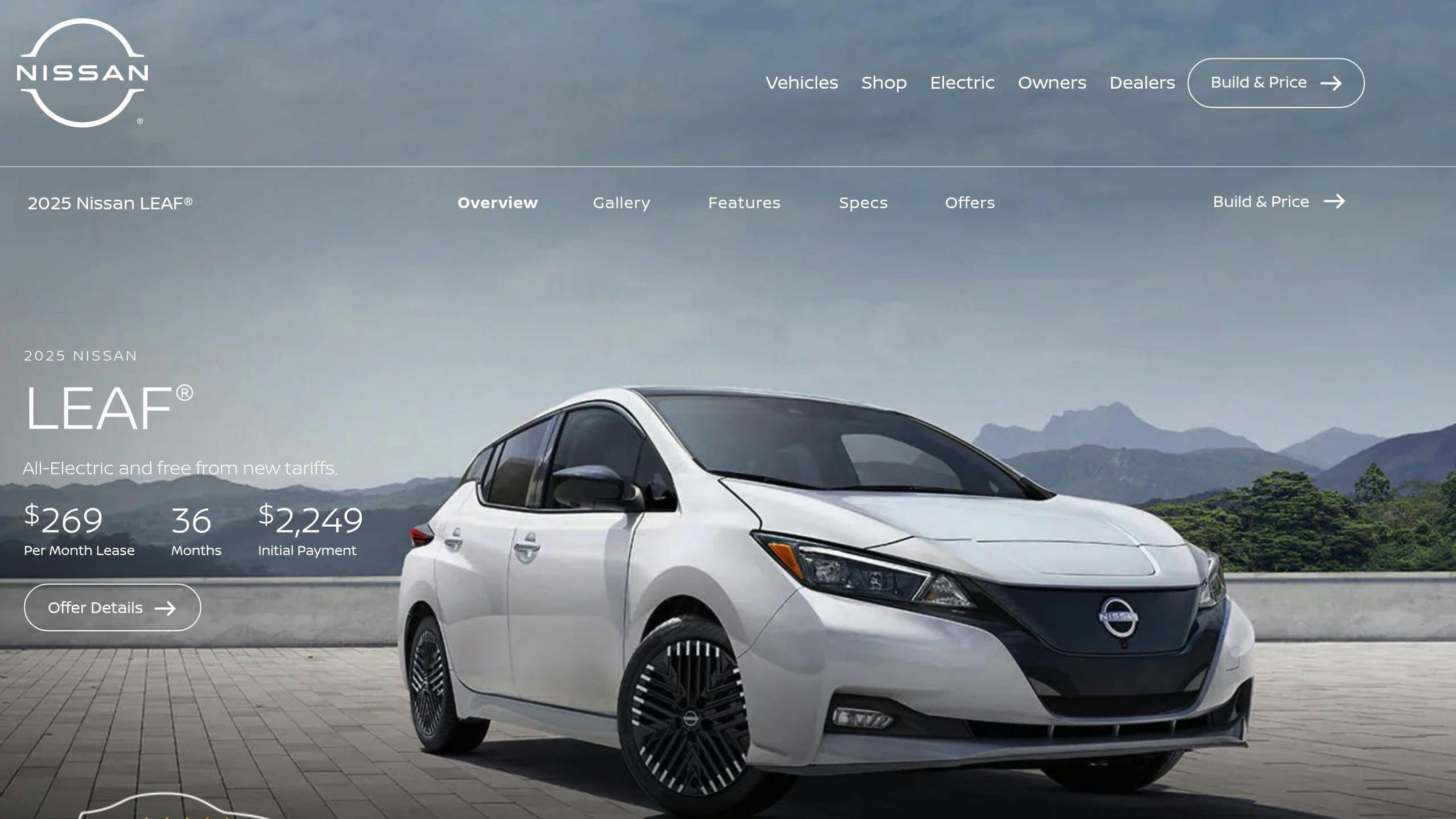
The Nissan Leaf offers a practical and affordable choice for Tanzanian drivers exploring the electric vehicle market. Known for its compact design and reliability, it’s an appealing option, particularly for those considering a used EV.
Price (USD)
In Tanzania, used Nissan Leaf models are readily available, offering a budget-friendly alternative to new models. For reference, the new 2025 Nissan Leaf starts at $28,140 for the base S model and $36,190 for the SV PLUS variant. This highlights the potential savings for buyers opting for pre-owned options.
Driving Range (km/miles)
The Leaf’s range depends on the battery size. Models equipped with the 40-kWh battery can cover approximately 149 miles (240 km), while those with the 60-kWh battery offer up to 212 miles (341 km). Certain versions even extend to 275 km. This range is ideal for daily commutes within Tanzanian cities, though longer journeys may require careful planning due to the current state of charging infrastructure.
Charging Infrastructure Suitability
Charging capabilities are a critical factor for EV users. The Leaf’s CHAdeMO fast-charging system can recharge the battery to 80% in 40–60 minutes. However, with Tanzania’s still-developing public charging network, most owners will need to rely on home charging setups.
"Public charging networks are provided by independent companies, and are not within Nissan’s control. Availability of charging stations not guaranteed." – Nissan USA
Ideal Use Case
The compact dimensions of the Nissan Leaf make it perfect for navigating crowded streets and parking in tight spaces. It’s particularly well-suited for urban professionals, small business owners, and families commuting within cities like Dar es Salaam, Arusha, and Mwanza. With its focus on paved urban roads, the Leaf is a practical choice for daily city driving.
2. TRÍ E2 Electric Three-Wheeler
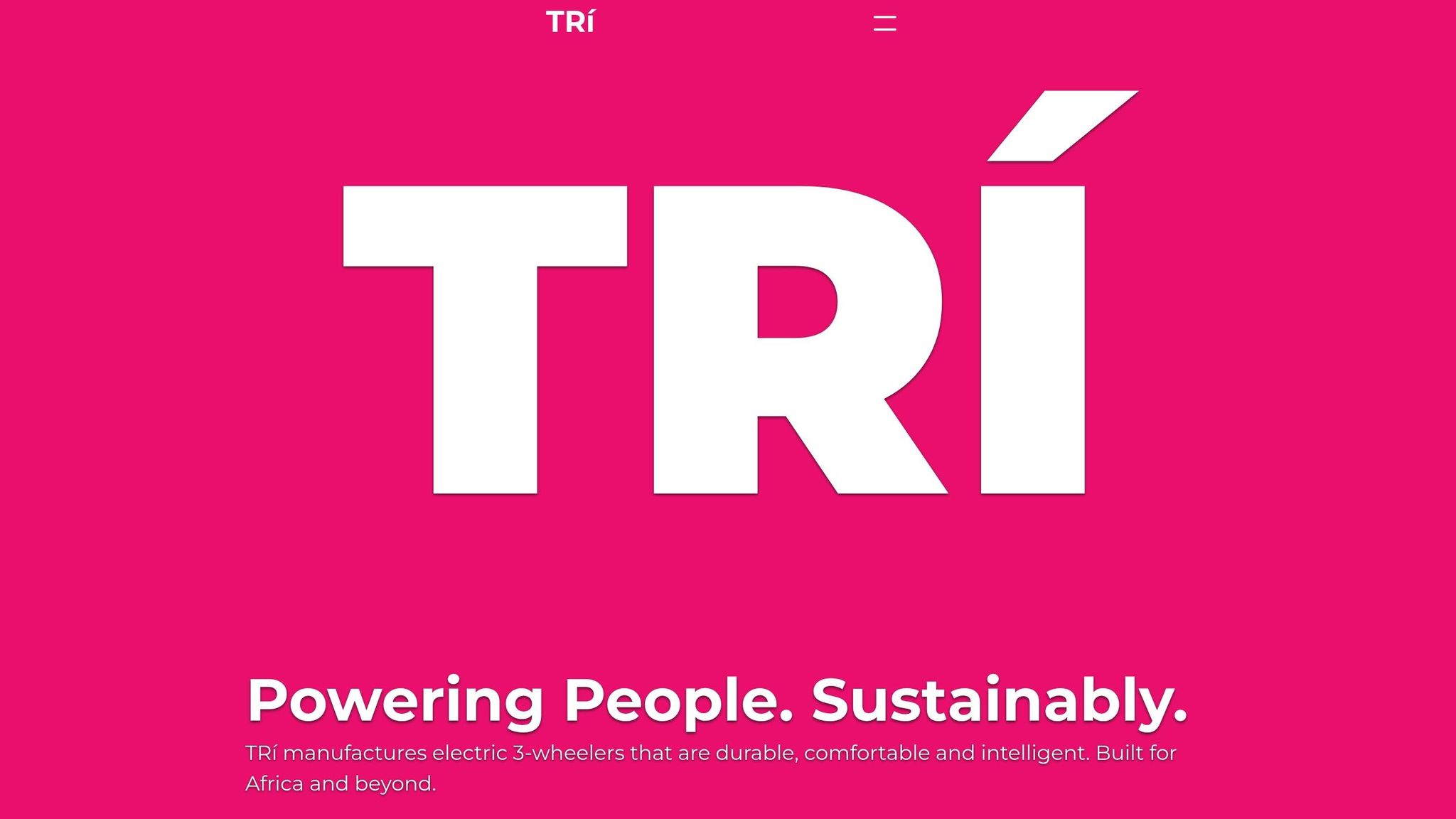
The TRÍ E2 Electric Three-Wheeler is designed to offer an affordable and dependable electric transportation option for commercial drivers. It’s a practical solution for daily business operations, combining cost efficiency with reliability.
Price (USD)
At $3,500 excluding VAT, the TRÍ E2 is priced competitively, matching the cost of traditional internal combustion engine three-wheelers in Tanzania. Thanks to TRÍ’s full manufacturing license in the country, the company benefits from local assembly incentives, helping to keep the price accessible. To make ownership even easier, drivers can choose between two financing options: a lease-to-own plan spread over two years or an outright purchase.
Driving Range
The TRÍ E2 boasts a range of 100+ kilometers (62+ miles) on a single charge, maintaining an average speed of 25 mph (40 km/h). This range is well-suited for most commercial drivers, including those who cover up to 124 miles (200 km) daily. With just 2.5 hours of charging per day, the vehicle can meet the needs of urban commercial routes with ease.
Charging Infrastructure
Instead of relying on battery swapping, TRÍ focuses on opportunity charging throughout the day. The E2 is equipped with an onboard charger that takes 5 hours for a full charge. Charging at dedicated stations in Dar es Salaam costs about $1.50 – a combination of 2,500 shillings for charging and a 1,000-shilling access fee. This is a fraction of the cost compared to the approximately $10 required for petrol to cover the same distance in a traditional three-wheeler. Home charging is another option, typically costing between $1 and $2 daily.
"We made a deliberate choice when we decided to focus on 3-wheelers first. Given the driving patterns that we had identified and the respective downtime of drivers, we saw great potential for opportunity charging, i.e., charging throughout the day at dedicated spots to extend the driving range. Hence, Swapping isn’t a hard requirement for the drivers to be able to meet their daily average kms driven. As a result, our entire operations are lighter / leaner and less capital-intensive. The combination of product-choice, supply-chain optimization and business-model choice allowed us to reach double digit positive gross margins since day 1." – Niko Kadjaia, TRÍ
Ideal Use Case
The TRÍ E2 is perfect for roles like taxis, deliveries, and logistical services. Take the example of Yassin Hamisi, who acquired an electric bajaj in 2020 through a lease-to-own program. This move significantly increased his income.
With operating costs of just $0.20 per 12.4 miles (20 kilometers) – a stark contrast to the $1.20 spent on gasoline-powered alternatives – the TRÍ E2 provides substantial daily savings, directly improving drivers’ earnings.
3. Toyota Prius Plug-in Hybrid
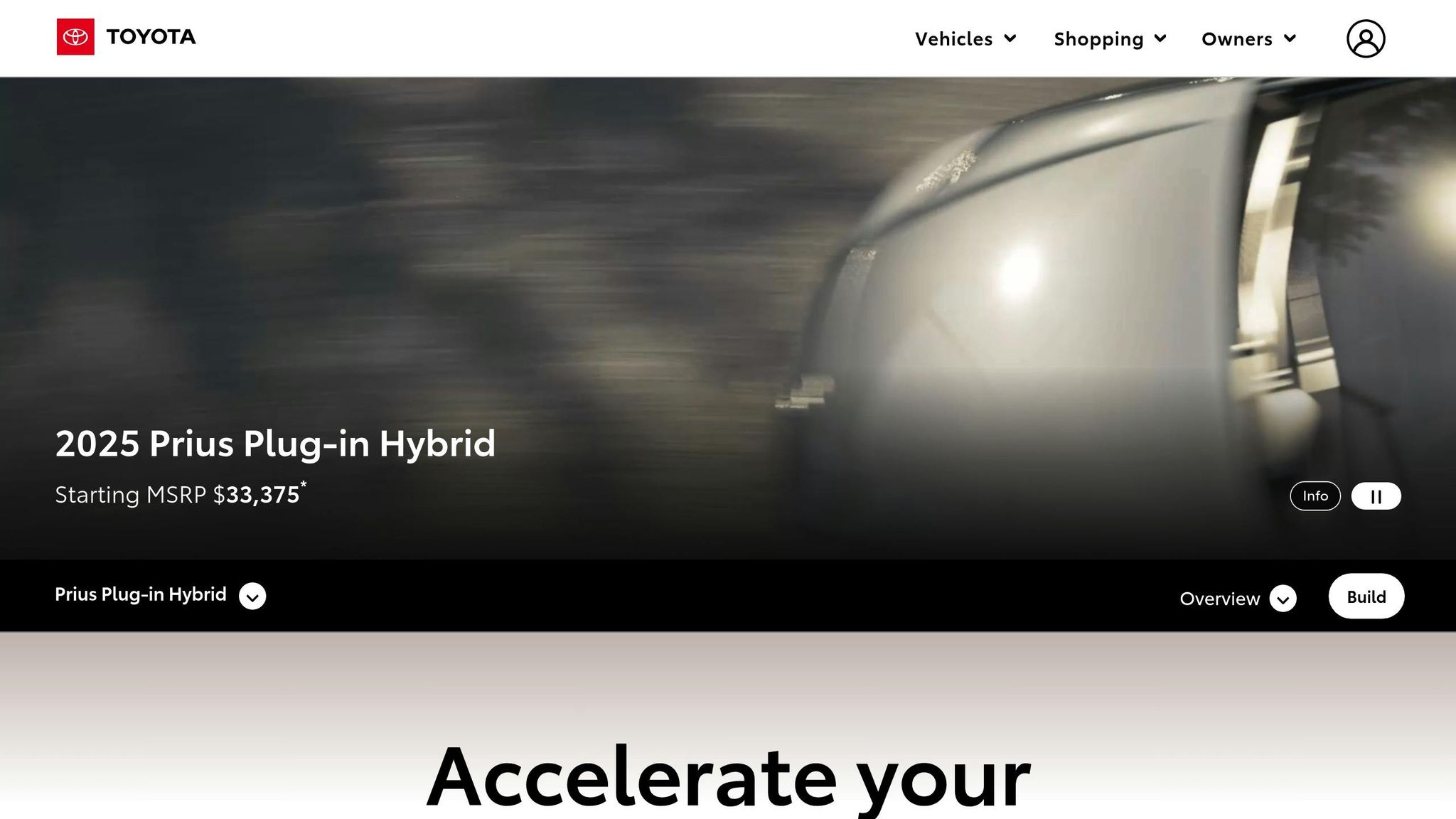
The Toyota Prius Plug-in Hybrid combines the convenience of electric driving for daily commutes with the reliability of a gasoline engine for longer trips or areas where charging options are limited.
Price
For 2025, the Prius Plug-in Hybrid offers three trim levels to suit different budgets: the SE starts at $33,375, the XSE at $36,625, and the XSE Premium at $40,070. In Tanzania, new models are priced between TZS 110,863,610 and TZS 125,863,530, while used models are available for TZS 25–35 million.
Driving Range
The SE trim delivers an EPA-rated all-electric range of up to 44 miles, while the XSE and XSE Premium trims provide around 39 miles of electric-only driving. In highway testing conducted by Car and Driver, the vehicle achieved about 33 miles in EV mode at 75 mph. Once the battery is depleted, the hybrid system offers an impressive 52 mpg combined. This combination ensures both efficiency and adaptability for various driving needs.
Charging Infrastructure Suitability
Equipped with a 13.6 kWh battery, the Prius Plug-in Hybrid is well-suited for Tanzania’s developing charging network. Charging at home is straightforward: a Level 1 (120V) charger takes 8–12 hours, while a Level 2 (240V) charger reduces the time to just 1.5–3 hours. The smaller battery size and hybrid setup minimize reliance on public charging stations, making overnight home charging a practical option. For longer trips, the gasoline engine provides added peace of mind.
Ideal Use Case
This hybrid is an excellent choice for urban professionals and families in cities like Dar es Salaam. It’s ideal for reducing fuel costs during daily commutes while offering the flexibility to handle occasional long-distance trips – all without fully transitioning to a battery-only electric vehicle.
4. Hyundai Kona Electric
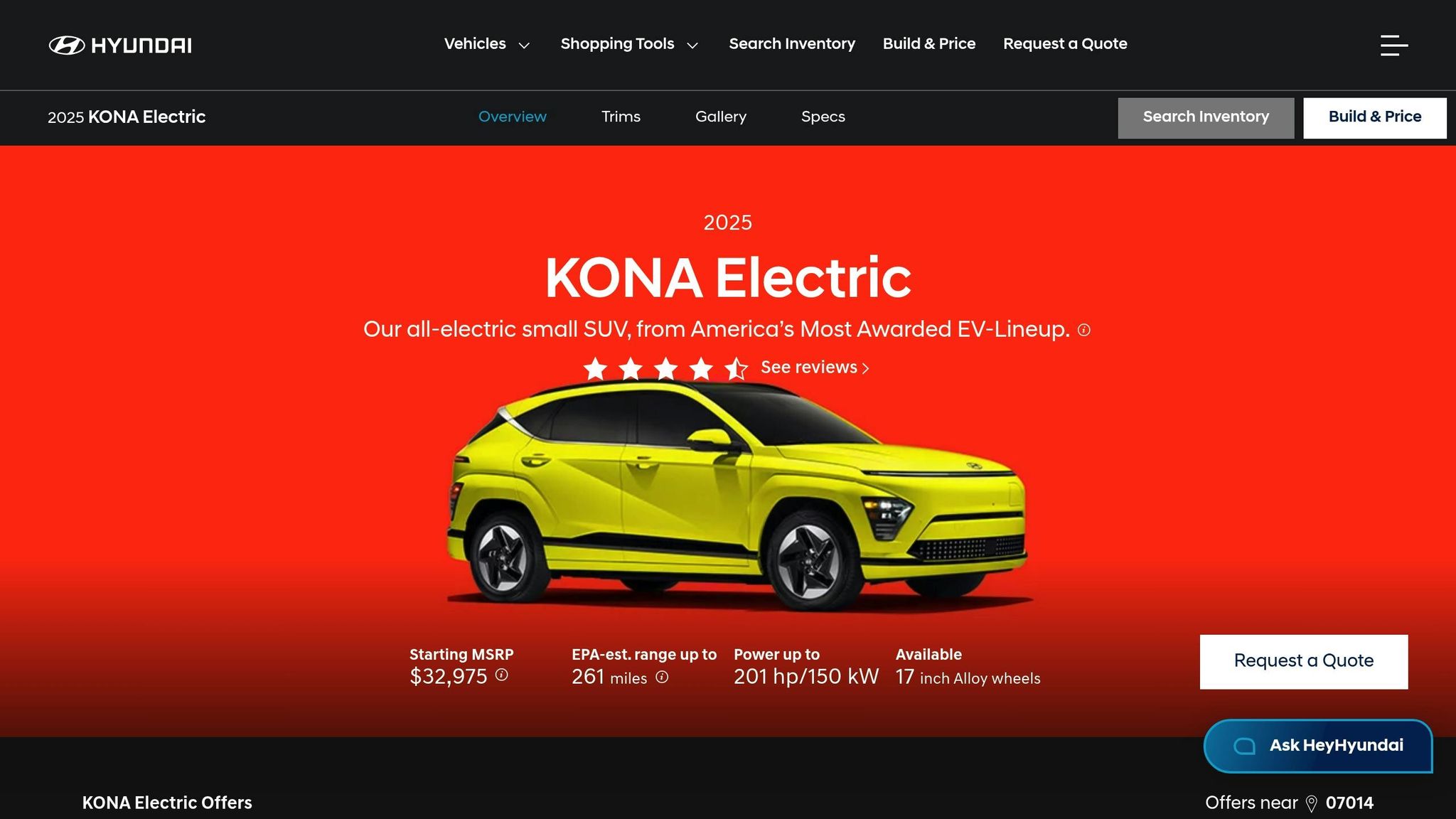
Next up in our look at affordable electric vehicles is the Hyundai Kona Electric, a compact SUV that stands out for its range and practicality. It’s a solid choice for drivers in Tanzania exploring reliable, fully electric options.
Price
The 2025 Hyundai Kona Electric starts at $32,975 for the SE trim and goes up to $41,150 for the Limited trim. In Tanzania, a new SEL model is priced at around TZS 95,456,000 (approximately $38,000), while used models typically range between TZS 35–50 million.
Driving Range
Equipped with a 68.5 kWh battery, the Kona Electric offers a driving range of 390–400 km (about 242–248 miles) per charge. This makes it suitable for a variety of travel needs, from city commutes to longer journeys, with the added benefit of efficient energy use.
Charging Infrastructure
The Kona Electric supports the CCS charging standard and works with both Type 2 AC and CCS DC connectors. For home charging, its 7.2 kW on-board charger can fully charge the battery in about 7 hours when paired with an 11kW charger.
For faster charging, the vehicle offers 50 kW DC charging capability. While Tanzania’s charging network is still developing, steps are being taken to expand it. For instance, a pilot charging station was recently set up in Dodoma in collaboration with UNDP Tanzania. Until public infrastructure grows, installing a reliable home charging setup is a practical solution.
Ideal Use Case
The Hyundai Kona Electric is a great match for families and professionals looking for a dependable EV for daily commutes and occasional longer trips. Its practicality shines when paired with home charging capabilities.
sbb-itb-d9186c2
5. Budget Models from Chinese Manufacturers
When it comes to affordable EV options for Tanzania, Chinese manufacturers are leading the way. They offer some of the most cost-effective electric vehicles on the market today, perfectly suited to local needs. At the forefront is BYD, which surpassed Tesla in global EV sales in 2024. Another strong contender is Jinpeng, known for its range of small electric vehicles and low-speed cars designed for basic transportation needs.
Price (USD)
The pricing of these models makes them highly attractive. BYD’s Seagull is available in three versions: the Vitality Edition starts at $8,000, the Freedom at $10,300, and the Flying at $11,700. Jinpeng, on the other hand, offers even more budget-friendly options. Their Electric Small Car is priced between $5,988 and $8,350. For the most economical choice, Jinpeng’s Factory Direct Sales Adult 4 Seat Mini Electric Car is priced at roughly $2,130 to $2,300, while their Electric Low Speed Car falls in the range of $4,380 to $4,700. These competitive prices make EV ownership a realistic goal for many Tanzanians, particularly when paired with ranges that cater to local driving habits.
Driving Range (km/miles)
The BYD Seagull offers an impressive range of 305–405 km (189–252 miles), meeting the preferences of 47.3% of Tanzanian respondents who prioritize a minimum range of 300 km. Jinpeng’s Model UNI, while more modest, provides range options of 140 km or 201 km (87–125 miles) depending on the battery configuration. This makes Jinpeng vehicles a practical choice for urban commutes and shorter trips.
Charging Infrastructure Suitability
Tanzania’s EV market is growing, with over 5,000 electric vehicles on the roads as of 2024. However, the development of charging infrastructure remains crucial. BYD’s Seagull, with its longer range, is better equipped to handle the current state of Tanzania’s charging network, which is expanding through government and private sector initiatives. Jinpeng’s models, with their shorter range, are ideal for urban areas where home charging is common and daily travel distances are manageable.
Ideal Use Case
The choice between these two manufacturers largely depends on the user’s needs. The BYD Seagull is a great fit for families and professionals looking for a reliable EV capable of handling both daily commutes and occasional longer trips. Its ability to navigate varied road conditions makes it versatile. On the other hand, Jinpeng’s models are perfect for urban residents, small business owners, or anyone needing a simple, cost-effective EV for short-distance travel. Additionally, BYD’s competitive production costs – 25% lower than those of Western competitors, according to a 2023 UBS report – further enhance its appeal, making electric mobility increasingly accessible for Tanzanian drivers.
Price and Features Comparison
To help you make an informed choice, here’s a breakdown of price ranges and purchasing details for some popular EV options. This comparison is designed to align with your budget and driving needs.
| Model | Price Range (USD) | Where to Buy |
|---|---|---|
| Nissan Leaf (Used) | $7,400 – $11,100 | AutoMag.tz |
| Toyota Prius Plug-in Hybrid (Used) | $9,300 – $13,000 | AutoMag.tz |
| Hyundai Kona Electric (Used) | $13,000 – $18,500 | AutoMag.tz |
| Budget Models from Chinese Manufacturers | Up to $22,500 | AutoMag.tz |
Among these options, the Nissan Leaf stands out as the most budget-friendly choice, with prices starting at just $7,400. It’s a reliable option for daily commuting without stretching your finances. On the other hand, newer budget models from Chinese manufacturers offer a broader range of features and remain accessible, priced under $22,500.
Purchasing through AutoMag.tz simplifies the process, as they handle imports and ensure delivery via the Port of Dar es Salaam. Additionally, buyers in Tanzania benefit from government incentives that exempt electric vehicles from VAT and customs duties. This means the prices listed above reflect the actual cost to buyers, with no hidden tax surprises.
When choosing your EV, consider your driving habits and the availability of charging infrastructure in your area. Use this comparison as a starting point to find the EV that best suits your needs.
Conclusion
Tanzania’s electric vehicle (EV) market offers a promising opportunity for those looking to move away from gasoline-powered cars. With government incentives like exemptions from import duties and zero VAT, the upfront costs of EVs are becoming more manageable. Beyond saving money, going electric helps improve urban air quality and places you at the forefront of a growing shift in Tanzania’s transportation landscape.
One of the key advantages of EVs is their simplicity – fewer moving parts mean lower maintenance costs over time. Plus, owning an EV eliminates the stress of fluctuating fuel prices, giving you more financial predictability. On top of that, the environmental benefits are clear, especially in reducing air pollution in busy cities.
Battery technology is advancing quickly, and global battery prices are expected to drop to $80/kWh by 2026. This trend is making EVs more affordable, with budget-friendly options from Chinese manufacturers expanding accessibility even further. As these advancements continue, reliable home charging solutions will become essential. Investing in a home charger and choosing models with higher ground clearance and a longer range can help you navigate Tanzania’s varied road conditions more effectively.
The momentum toward electric mobility is growing across East Africa, supported by government initiatives and increasing consumer interest. Whether you’re considering a cost-effective Nissan Leaf for city driving or exploring newer Chinese EV models, now is a great time to make the switch. By following the practical tips provided in this guide, you can confidently embrace the future of transportation in Tanzania.
FAQs
What are the key advantages of driving an electric car in Tanzania?
Switching to an electric vehicle (EV) in Tanzania offers several important advantages:
- Lower operating costs: EVs are cheaper to run and maintain because they have fewer components that wear out and don’t rely on gasoline or diesel.
- Cleaner transportation: Since EVs produce zero tailpipe emissions, they help reduce air pollution, making the environment healthier for everyone.
- Reduced fuel dependency: By using electricity instead of imported fossil fuels, EVs can cut down on the country’s reliance on expensive fuel imports, potentially making transportation costs more stable.
Opting for an EV not only supports a healthier environment but also contributes to economic stability and public well-being in Tanzania. With more affordable options now available, making the switch to electric transportation is easier than ever.
What is the current state of charging infrastructure for electric vehicles in Tanzania?
Tanzania’s EV Charging Infrastructure: A Work in Progress
Tanzania’s electric vehicle (EV) charging infrastructure is still in its infancy, with only a handful of charging stations available. For EV owners, this can pose challenges when it comes to finding convenient places to recharge.
That said, there’s reason for optimism. Both the government and private sector are taking active steps to expand the charging network. These efforts include installing additional charging stations and promoting e-mobility initiatives aimed at making EV ownership more feasible in the long run. While the network remains limited for now, these strides highlight a growing dedication to fostering EV adoption across Tanzania.
Are there any government incentives for buying electric vehicles in Tanzania?
The Tanzanian government has implemented zero import duties on electric vehicles (EVs) and offers lower taxes on EV components. These efforts aim to make EVs more accessible while promoting greener transportation options. There are also plans in the works to roll out additional incentives, including tax breaks for EV registration and investments in charging infrastructure, to further boost the adoption of electric vehicles across the country.
Related Blog Posts
- Tanzania’s EV Adoption: Key Challenges
- Tanzania’s EV Import Duty Exemptions Explained
- Best used cars in Tanzania 2025
- Car prices in Dar es Salaam

